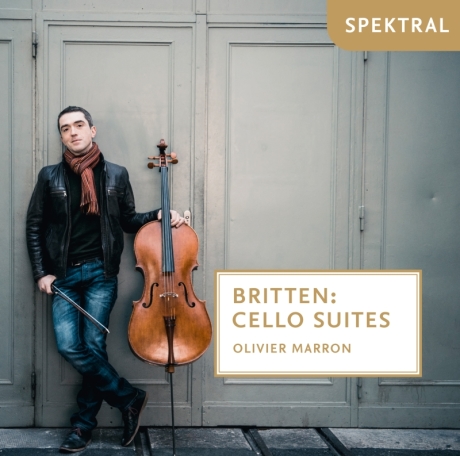
THE CLASSICAL REVIEWER (Friday, 9 January 2015)
There are, of course, many recordings of these works ranging from their dedicatee Mstislav Rostropovich to Marron’s own teacher Jean-Guihen Queyras.
However, Olivier Marron rises to the occasion superbly. With the First Suite for Cello, Op.72 (1964) he provides a thoughtfully laid out Canto primo: Sostenuto e largamente with lovely sonorities, showing a very fine technique giving the music space to breathe, revealing an appropriately withdrawn feeling. By contrast the Fuga: Andante moderato has a playful quality though tinged with a rather macabre veil. Marron is fully able to see the overall structure revealing all of Britten’s contrapuntal lines. He brings more fine textures and sonorities to Britten’s strangely spare ideas.
Marron’s long, deeply considered phrases bring a melancholy, deeply troubled spirit to the Lamento: Lento rubato. The Canto secondo: Sostenuto leads seamlessly into the hushed and brief Serenata: Allegretto, pizzicato phrases bringing hints of a warmer Latin flavour, very finely played trailing away beautifully at the end. The Marcia: Alla marcia moderato brings some fine harmonies from Marron as he leads us through this strange section, full of panache yet with moments of whimsy and, eventually, some passion before a lovely coda.
Marron brings a mournful quality to the Canto terzo: Sostenuto with rich deep harmonies adding to the depth of this music. Marron slowly leads the music up, full of subtle moments of angst. The Bordone: Moderato quasi recitativo creeps in almost surreptitiously bringing a feeling of intense disquiet before the gently swaying, ghostly hushed passage. The Moto perpetuo e Canto quarto: Presto allows Marron the opportunity to really reveal his virtuoso technique in this fast moving section, brilliantly executed.
The Declamato: Largo of the Second Suite for Cello, Op. 80 (1967) brings a more open emotional state. Here Marron’s tone is really quite lovely before rising in passion but falling to the quiet coda. It is in such sections as the Fuga: Andante that Marron is especially fine as he slowly works out the material, beautifully phrased and considered with some lovely little harmonies.
The Scherzo: Allegro molto brings a terrific forward drive offset by moments of fine detail before the beautifully laid out Andante lento reveals a ghostly theme over soft pizzicato phrases, played with terrific expression. As the theme slowly emerges, full of passion and torment, there is some fine playing before an exquisite coda. Marron’s superb technique is again to the fore in the Ciaccona: Allegro played with great control, fine attention to dynamics and lovely phrasing as well as fine textures and colours.
There seems to be a feeling of resignation in the Introduzione: Lento of theThird Suite for Cello, Op.87 (1971) something which Marron reveals as the theme slowly winds its way forward over pizzicato notes. There are very fine harmonies, beautifully phrased before moving into the Marcia: Allegro with fine bounced rhythms, such light bowing as the music increases in passion. The Canto: Con Moto brings a little calm as Marron produces some richly coloured timbres.
We are led perfectly into the Barcarolla: Lento with its gently rocking theme where Marron provides such subtle control of dynamics. There is a very finely handled Dialogo: Allegretto before a finely wrought Fuga: Andante espressivo that receives a fine breadth and lovely sonorities.
The Recitativo: Fantastico brings some terrific flights of fancy superbly played here with some superb harmonics before the Moto perpetuo: Presto where Marron gives us a real presto in which he nevertheless finds many details, textures or colours. Marron brings a mournful Passacaglia: Lento solenne with moments of intense passion and drama, full of so many emotions before the hushed coda.
Marron has obviously looked deeply at these scores enabling him to bring a depth and consideration to them. This is an impressive disc. I’m sure we’ll be hearing a lot more from this cellist. The sound in my download copy is excellent.
http://theclassicalreviewer.blogspot.co.uk/2015/01/on-his-new-recording-of-britten-suites.html